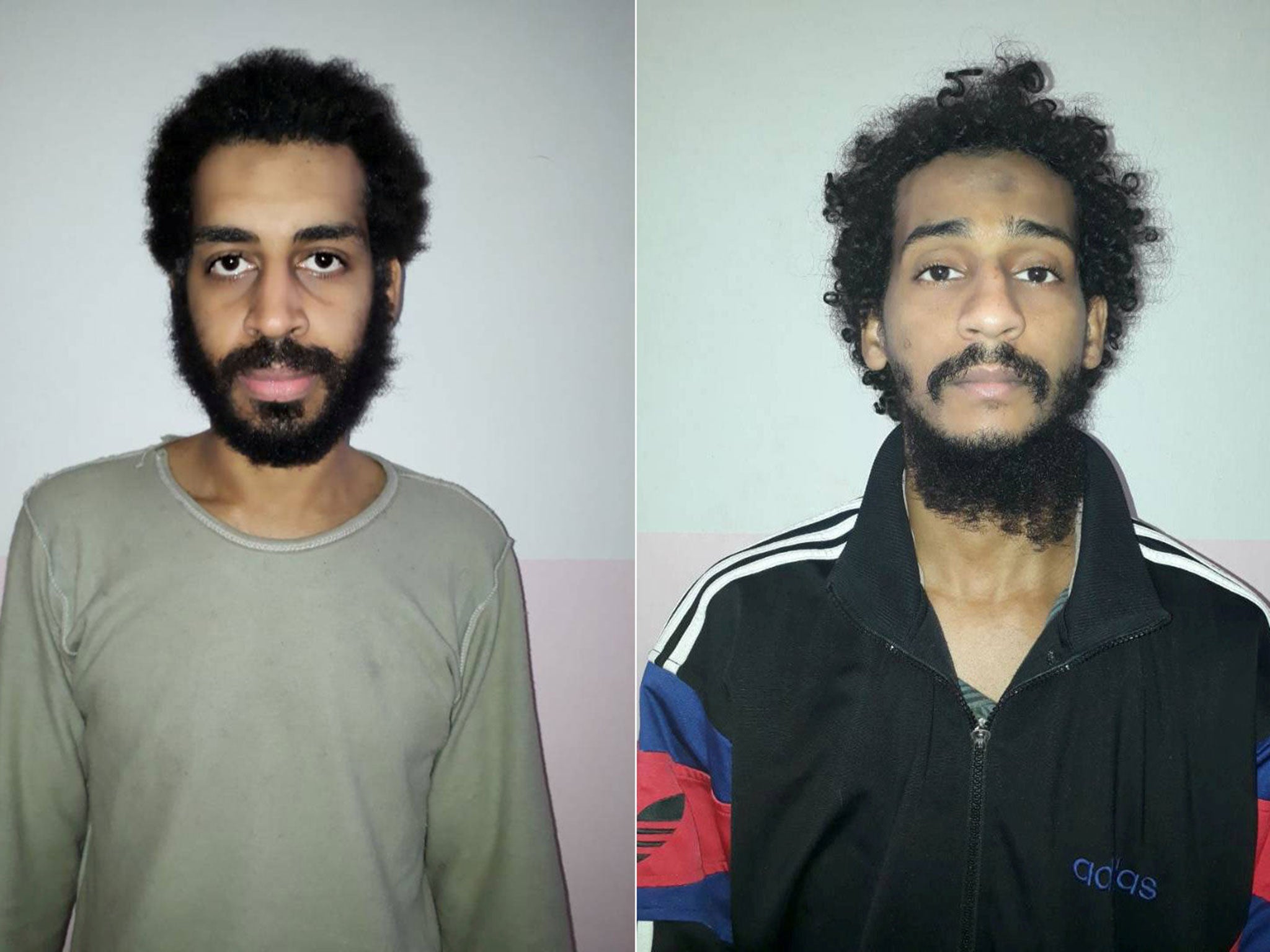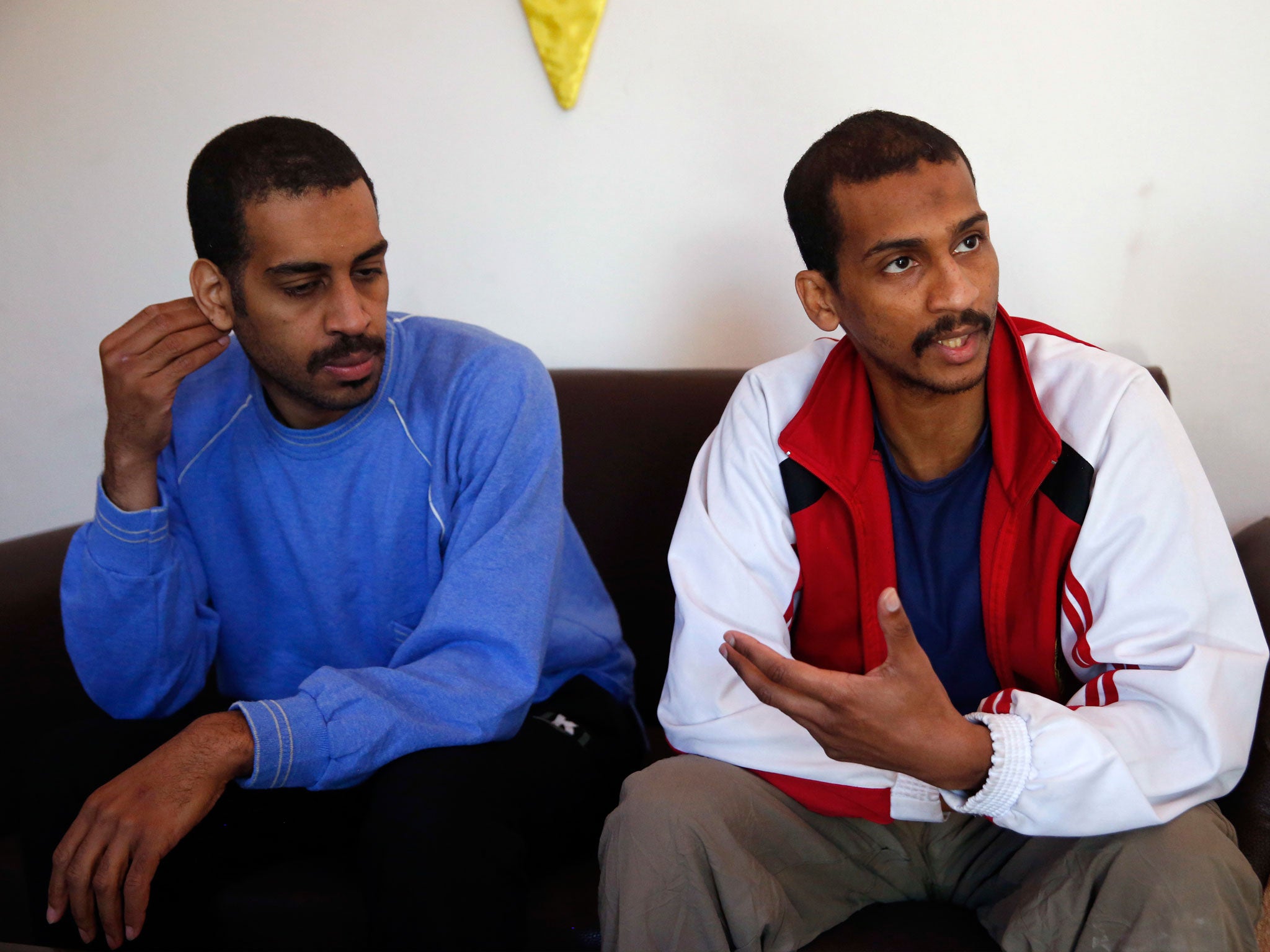High Court rejects challenge over UK sharing evidence about suspected Isis ‘Beatles’ terrorists with US
Capture of pair last year sparked row over whether they should be returned to the UK

The High Court has rejected a challenge over the UK government’s decision to share evidence with American authorities about two suspected Isis terrorists without seeking assurances they will not face the death penalty in the US.
Lord Chief Justice Lord Burnett and Mr Justice Garnham said the government’s decision to pass on information regarding the suspects, both raised in Britain but stripped of their citizenship, was not unlawful.
El Shafee Elsheikh and Alexanda Kotey are accused of belonging to a four-man cell of IS executioners in Syria – nicknamed “The Beatles” because of their British accents – responsible for killing a number of high-profile western captives.
The pair were captured in January last year, sparking a row over whether they should be returned to the UK for trial or face justice in another jurisdiction, possibly the US.
Elsheikh’s mother, Maha Elgizouli, challenged the home secretary Sajid Javid’s decision to share 600 witness statements gathered by the Metropolitan Police with US authorities under a Mutual Legal Assistance (MLA) agreement, without seeking assurances that the men would not face execution if they were extradited and tried there.
But her challenge was rejected on Friday by two leading judges, who ruled that the decision was within the law. Lord Burnett said there was “no general, common law duty on Her Majesty’s Government to take positive steps to protect an individual’s life from the actions of a third party” in the case.
At a hearing in October 2018, Ms Elgizouli’s lawyers said Mr Javid’s decision, which was outlined in a letter to then US attorney general Jeff Sessions, was “unprecedented and unjustified” and put the suspects at risk of an “inhuman punishment”.
Responding to Friday’s ruling, Mr Javid said: “I am pleased the court has upheld my decision on all grounds in this case. My priority has always been to ensure we deliver justice for the victims’ families and that the individuals suspected of these sickening crimes face prosecution as quickly as possible.
“Our longstanding opposition to the death penalty has not changed. Any evidence shared with the US in this case must be for the express purpose of progressing a federal prosecution.”
Ms Elgizouli’s lawyers said the decision was difficult for their client to “take on board”. Gareth Peirce, of Birnberg Peirce Solicitors said: “She continues urgently to question whether indeed her son could not be prosecuted in this country.
“Ms Elgizouli hopes that the opportunity will be given for the Supreme Court to consider whether it has a greater ability to explore the important factors raised in the case she has brought.”
Kotey and Elsheikh, who both grew up in west London, are believed to be detained by Kurdish forces in Syria and have been stripped of their British citizenship.
They are thought to have been members of the cell which also included Mohammed Emwazi, known as Jihadi John, who was killed in a US air strike in 2015, and Aine Davis, who has been jailed in Turkey.

The pair were declared “Specially Designated Global Terrorists” by the US State Department ahead of their capture in January, with official documents naming them as members of “The Beatles” and stating that the cell had beheaded more than 27 hostages and tortured many more.
The Crown Prosecution Service (CPS) decided there was “insufficient evidence” to prosecute them in the UK. In July 2018 security minister Ben Wallace said: “We do not think we have the evidence here to try them in the United Kingdom and we hope that a trial will be carried out in the United States.”
After Ms Elgizouli launched legal action, the Home Office announced in July that it had agreed to a “short-term pause” of the MLA process with the US.
Mr Javid faced intense criticism after the letter he wrote to Mr Sessions in which he said he would not seek assurance over death sentences was leaked, with MPs accusing him of breaching the UK’s long-standing opposition to the death penalty.

Lord Carlile, who led a government review of anti-terror legislation, branded the move “extraordinary” and said it was a “dramatic change of policy”.
Prime Minister Theresa May supported Mr Javid’s original decision, which was also backed by Boris Johnson when he was foreign secretary.
But the MLA sparked widespread criticism in Westminster from across the political divide. Both Labour MP Diane Abbot and Conservative MP Ken Clarke have raised objections to the government’s failure to give assurances over capital punishment.
Additional reporting by Press Association
Bookmark popover
Removed from bookmarks